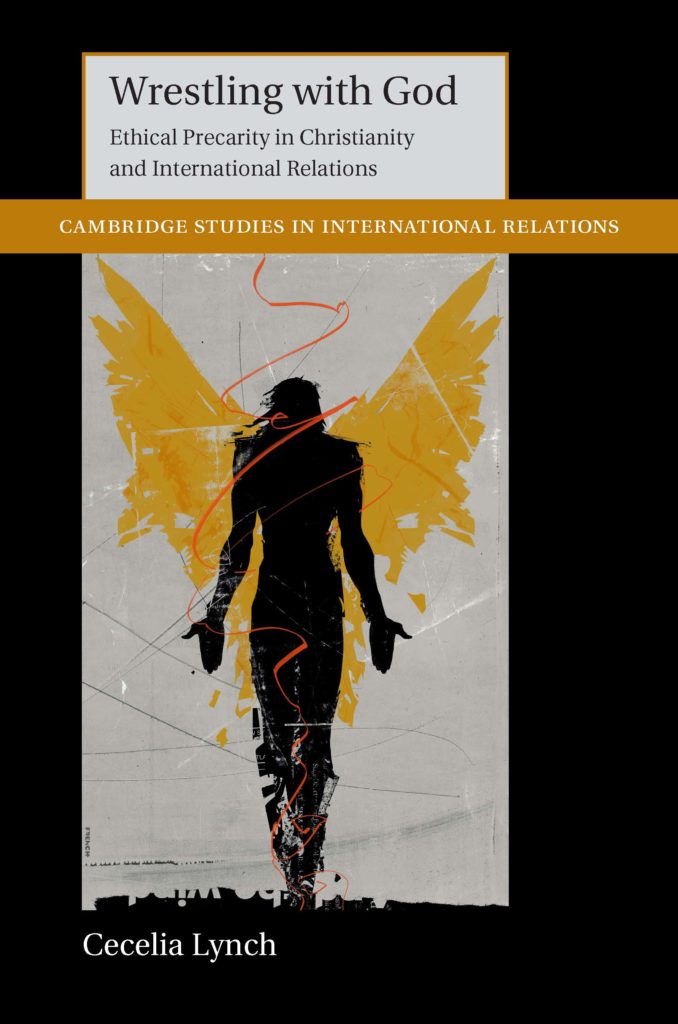 In Wrestling with God: Ethical Precarity in Christianity and International Relations, Cecelia Lynch provides a genealogical account of Christianity’s role in shaping the field of international relations. Throughout the book, Lynch creatively puts a geographically diverse set of thinkers from different moments in history into conversation with one another. She does this so that we might not only understand the past better, but also think with it more constructively in the present. By looking at how Christian theologians confronted the political and social contingencies of their day, Lynch shows how the logic of Christian missionizing and humanitarian activity arose during the colonial era of conquest and continues into the present, albeit now more often in the work of NGOs (non-governmental organizations) and FBOs (faith-based organizations). Drawing on Judith Bultler, Lynch contends that we should see these actors in history, and ourselves, as precarious creatures—that is, as persons vulnerable to violence and injustice—perched within traditions not of our own making, but to which we can draw on to further the common good (66). This is what Lynch aims to do in her examination of the Christian tradition in this context.
In Wrestling with God: Ethical Precarity in Christianity and International Relations, Cecelia Lynch provides a genealogical account of Christianity’s role in shaping the field of international relations. Throughout the book, Lynch creatively puts a geographically diverse set of thinkers from different moments in history into conversation with one another. She does this so that we might not only understand the past better, but also think with it more constructively in the present. By looking at how Christian theologians confronted the political and social contingencies of their day, Lynch shows how the logic of Christian missionizing and humanitarian activity arose during the colonial era of conquest and continues into the present, albeit now more often in the work of NGOs (non-governmental organizations) and FBOs (faith-based organizations). Drawing on Judith Bultler, Lynch contends that we should see these actors in history, and ourselves, as precarious creatures—that is, as persons vulnerable to violence and injustice—perched within traditions not of our own making, but to which we can draw on to further the common good (66). This is what Lynch aims to do in her examination of the Christian tradition in this context.
In her examination, Lynch prioritizes practice over doctrine, i.e. what people do rather than what they profess to believe. In doing so, what comes to the forefront is the process of ethical reasoning rather than its doctrinal precedence or results. Ethical reasoning, on this account, is a form of casuistry, where “religious actors constantly interpret and reinterpret teachings in order to meet their needs for living and acting in specific places and times” (57). In other words, it is a bottom-up process, one where the practical realities of the world shape how we respond to challenges and eventually shape what we call doctrine. It is decidedly not a top-down process, one where we apply previously established principles to new matters without considering the restraint of contingencies. It is these contingencies which make our actions, and our sense of self, precarious.
Lynch treats each of the subjects with whom she engages throughout the book as ethically precarious, practically reasoning actors. It would be impossible to provide a complete overview of the thinkers and arguments that Lynch weaves together throughout this book. Indeed, in each historical era, she makes clear that there is no single interpretive line amongst Christian thinkers, and gives ample attention to a variety of influential philosophers, theologians, and political thinkers. She begins in the colonial era, focusing on the arguments made by theologians like Bartolomé de las Casas and Eusebio Kino concerning the treatment of indigenous peoples in the newly “discovered” Americas. She shows how the terms of these debates concerning, for example whether it was necessary to convert, kill, or peaceably live alongside indigenous peoples were shaped by the contingencies of exploration and the restraints of doctrine. But in responding to these contingencies, she explains, doctrine itself was changed. Her story continues in her discussion of debates about war amongst Protestant and Catholic theologians in the modern world. Lynch dives deep into the 1932 debate between H. Richard Niebuhr and his brother, Reinhold, on the ethics of intervention in the Sino-Japanese conflict. She does so, however, while situating it within its wider theological and political context. She demonstrates, for example, that H. Richard Niebuhr’s account of non-violence was not the only possible interpretation at the time. She shows how a Catholic thinker like Dorothy Day interpreted the Christian tradition in an even more radically pacifist way than H. Richard Niebuhr as an active mode of non-violent resistance. Before ending the book by exploring the current constellation of neoliberal NGOs and FBOs, Lynch explores how liberation theology took up the same Christian teachings as their elder brethren, and yet saw in them a message more concerned with standing with the poor and marginalized. What one is left with after reading this book is a genealogy of Christianity’s role in international relations that balances a wide-ranging scope with historical depth. This approach makes it possible for the actors that appear in each of her chapters to speak to one another and to readers.
In the responses to the book collected in this symposium, the contributors engage with the theoretical as well as ethical questions that Lynch’s book raises. Diane L. Moore puts Lynch’s account of precarity into conversation with Donna Harraway’s notion of “staying with the trouble” to further reveal what an expansive notion of the common good might entail. Michael Barnett wrestles with the boundaries of how we classify Christianity. Atalia Omer extends Lynch’s discussion of technocratic humanitarianism in our present moment and thinks with her about what it means to center those at the margins of religious traditions so that we can imagine new horizons of ethical possibility. Relatedly, Emma Tomalin reflects on the importance of prioritizing local faith actors in overcoming current neoliberal approaches to humanitarian aid.
In thinking both critically and constructively with Christian thinkers from both the past and present, Lynch’s book shows how we might employ critical genealogical methods without succumbing to a cynical and/or fatalistic view of the world. This creative engagement is key to navigating the challenges of modernity and grappling with contested notions of the secular and the sacred. In significant ways, this forum builds upon themes of our previous symposium on Giuliana Chamedes’s A Twentieth-Century Crusade: The Vatican’s Battle to Remake Christian Europe, which also gathered scholars together to think both historically and constructively about religion’s role in shaping geopolitical realities in modernity.

